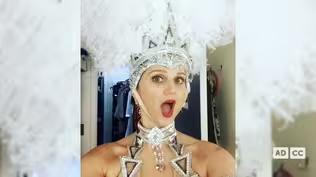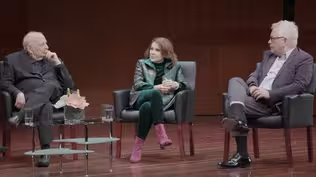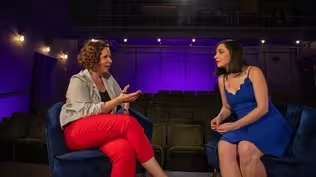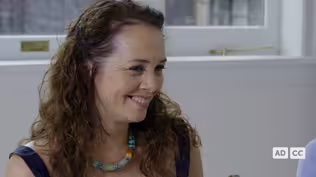
Julie Benko (AD, CC)
Season 3 Episode 1 | 26m 46sVideo has Audio Description
Broadway’s Julie Benko discusses representation and inclusion in the entertainment biz.
Actors Julie Benko (Broadway’s “Funny Girl”) and Lynne Marie Rosenberg (HBO's “High Maintenance") discuss Jewish representation in media and the increase of Jewish stories on Broadway amid rising antisemitism. Access: Audio description, captions.
See all videos with Audio DescriptionADProblems playing video? | Closed Captioning Feedback
Problems playing video? | Closed Captioning Feedback
Famous Cast Words is a local public television program presented by WLIW PBS

Julie Benko (AD, CC)
Season 3 Episode 1 | 26m 46sVideo has Audio Description
Actors Julie Benko (Broadway’s “Funny Girl”) and Lynne Marie Rosenberg (HBO's “High Maintenance") discuss Jewish representation in media and the increase of Jewish stories on Broadway amid rising antisemitism. Access: Audio description, captions.
See all videos with Audio DescriptionADProblems playing video? | Closed Captioning Feedback
How to Watch Famous Cast Words
Famous Cast Words is available to stream on pbs.org and the free PBS App, available on iPhone, Apple TV, Android TV, Android smartphones, Amazon Fire TV, Amazon Fire Tablet, Roku, Samsung Smart TV, and Vizio.
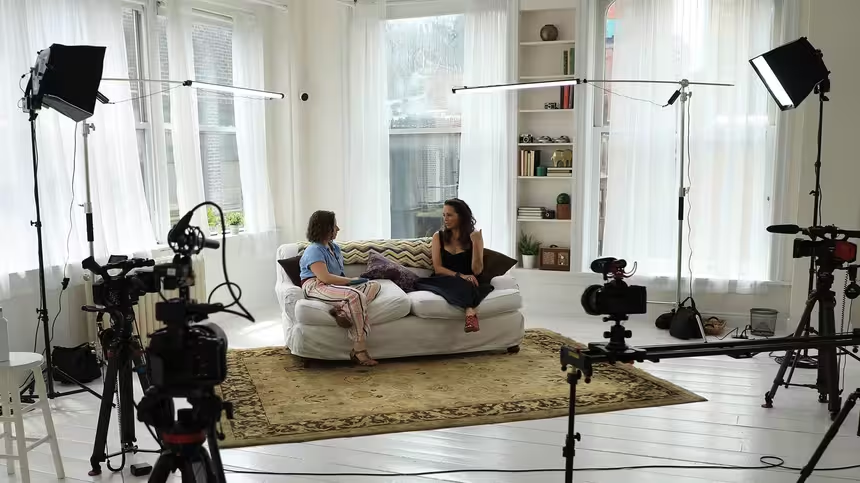
Inside the Series
Go behind the scenes of "Famous Cast Words" to learn about how the episodes came together.Providing Support for PBS.org
Learn Moreabout PBS online sponsorshipNarrator: The following program is available with audio description and closed captions.
I don't know how you do that number and not be Jewish.
♪♪ Hi.
I'm Lynne Marie Rosenberg.
Welcome to "Famous Cast Words."
I am here today with writer, actor, and singer Julie Benko.
You might know Julie as Fanny Brice in Broadway's "Funny Girl," or for originating the role of Ruth in Broadway's "Harmony."
You might not know her as Henri the Pigeon in her second grade production of "The American Tail."
Thank you for joining us, Julie.
Bonjour.
Bonjour.
Bonjour!
I'm so happy to have you here.
You are joining us right now in a very busy time in your life.
You are currently in "Funny Girl" on Broadway.
Yes.
For anyone who has not had the pleasure of seeing "Funny Girl" or seeing the movie many, many years ago, can you tell us a bit about what the show is and who you play?
Yeah, so I play Fanny Brice.
The story of "Funny Girl" is the story of Fanny Brice, who was a comedian and a trailblazer who lived in the early 1900s and worked, you know, in the Ziegfeld Follies.
And she was a a big, huge, ginormous star.
And then, of course, Barbra Streisand famously originated the role of Fanny Brice in "Funny Girl."
And Barbra Streisand became an icon playing that part.
And then we've had a few different Fanny's in the Broadway production, and I've been very lucky to be on a very, very wild, wonderful journey getting to play this character and become associated with "Funny Girl."
Yeah, it is a tour de force.
You barely leave the stage.
Yes.
It must be an exhausting role to do.
It is.
You know, you have 21 costume changes and like 15 songs and so many scenes, and it's a lot whatever way you slice it.
Oh, yeah.
Yeah.
In "Funny Girl," you were a standby, and now you're an alternate.
Can you tell us what that means?
Yes, a standby is someone who is on a principal contract, but they're an off stage member of the company, and they're always on call to jump on and do the role at a moment's notice.
An alternate is just like a standby, except they have a regular schedule of performances.
So for "Funny Girl," but then I am also on standby at the theater for all the other shows.
So you started as a standby in "Funny Girl," and then you wound up doing the role eight shows a week all your role for what, about?
It was five weeks, and then I became the alternate when Lea started, but then Lea got COVID immediately, so it ended up being about seven weeks.
But yeah, it was five officially.
Yeah.
Yeah.
What is the sort of different skill set of approaching a role that is someone else's track ultimately?
Well, first of all, you have to have a cool head.
Yeah.
And you have to be a very organized person.
You can't be the kind of person who's going, "I'm just going to wait for them to teach me," because so much is going on when a show is starting, when you're in rehearsals.
You, as the understudy, are the last person -- You're just the last thing on anybody's mind.
Right.
There's so much to do.
Right.
So when you are the person who is not -- you know, the role hasn't been literally built for you.
So you have to be super flexible and just, "Okay, I'll make it work."
I will find a way to make it work.
And the thing is, I was very lucky, at least in "Funny Girl."
They were very cool about saying, "Oh, let's find what works for you."
That's great.
And the show that I started with versus the show that I found doing it eight times a week versus the show that I do now, I feel like has really evolved and I've been able to relax and play so much more.
You are a Jewish woman, and you bring an authenticity to this role of Fanny Brice, who was a Jewish woman that, I think, in a non-Jewish performer's body and voice, could be potentially a gauntlet of stereotypes.
What does it mean to you to be a Jewish woman in this role and be able to bring that part of yourself to this role?
There are very few roles that are written specifically for Jewish women.
Yeah.
And, you know, I struggle sometimes as an actor.
I don't want to only play Jewish people.
You want to be an actor and play just a person, right?
Yeah, yeah.
But then when there are these moments where you go, "Okay, Fanny Brice, one of the greatest Jewish performers of the 20th century," right?
And there are other roles that come to mind, like Carole King, right?
There are certain parts that are like really iconic Jewish women who lived.
Yeah.
And so I think specifically when I think about Fanny, it's like she has this clown routine in act two, where she plays Private Schwartz and she's wearing bagels on her costume, and she's putting on this Yiddish accent, and she's really proud to be American.
[ Yiddish accent] Hello.
This is Private Schwartz.
And I'm here to tell you that if you want to fight for democracy like me, you should click on the link in my bio and make sure you are registered to vote this November.
Guys, we got to do it for the bagels.
And Fanny Brice, the real Fanny Brice, made a career of poking fun at the Jewish stereotypes of the day.
Right.
But she was in that group, so she had the permission because she was laughing with her community, and her community was laughing with her.
I think it's tricky when you are not from that community and you are... [ Yiddish accent ]...putting on this accent.
[ Normal accent ] You know, and wearing bagels, and you're being a clown.
That to me, it feels like, Sarah Silverman spoke at length about Jewish female representation, and she used the word "Jew-face."
And I think it can feel like that, you know, where you go, "Well, at what point is it okay and what point isn't it?"
I think every role and every show has its own sort of unique -- You have to take each thing separately.
But I think with Fanny, I don't know how you do that number and not be Jewish.
The New York Times named you the 2022 breakout star for theater.
They did.
That had to feel great.
And has that happened for an alternate or an understudy before?
I don't think so.
Okay.
That's -- It's really remarkable because when I saw that, I thought, I feel like this is usually someone who had their debut or they originated a role, and you got it as an alternate and understudy, and that feels very special.
Yes.
What does that mean to you?
Well, first of all, it's a really I think -- it was a nice thing for all the understudies and swings who never get accolades.
So for me to get that, I think really felt like, especially in the pandemic, which the understudies were the people who were keeping the doors open, it felt like the community saying, "We see what you... went through."
So, you are about to originate a role of Ruth in "Harmony."
Could you tell us about "Harmony" and about the part that you play in it?
Yeah, so "Harmony" is a "new musical" with music by Barry Manilow and book by Bruce Sussman.
And I say new musical because -- I was going to ask you about your air quotes.
Yeah, because it's been trying to come to Broadway for a long time, and it finally is arriving on Broadway after like 25 years of developing this show.
So it's a show that's about the Comedian Harmonists, who were a singing group in Germany in the 1920s and '30s, and they were world famous.
They were sort of a mix between the Manhattan Transfer and the Marx Brothers.
They were funny, but they had this tight harmony thing, and they toured the world, and they played Carnegie Hall, and then the Nazis came to power.
And so the show is about what happens to this group when the Nazis came to power, and the composer of the group and pianist of the group is not Jewish, but he has a Jewish wife, and that is me.
So my character is -- she's a Bolshevik activist, and she marries this guy and then basically has to deal with what happens when he does not stand up to the Nazis and her disappointment.
What happens when your spouse does not take the stand on your behalf that you hope they will?
This show has taken about 25 years to get to Broadway, and it is arriving on Broadway at this moment -- A -- where unfortunately, we are seeing an incredible rise in anti-Semitism in the United States and also abroad.
And -- B -- there are a lot of shows on Broadway right now that happen to deal with anti-Semitism.
We've got "Leopoldstadt", we've got "Harmony."
"Parade."
"Parade," yeah.
Yeah.
Yeah.
What does it mean to you to be sort of part of this interesting almost kismet-y collision of both a rise in anti-Semitism and a rise in representation of Jewish stories?
I guess I would say I actually don't think it's that kismet-y that all these stories are coming back to Broadway right now.
Right.
I think the reason they're coming back -- There's an intentionality there.
Is that we're seeing this rise in anti-Semitism.
And, you know, I think we've been seeing that for a while now.
And it certainly I think, you know, in 2016, like, was hard to ignore, you know, when you have Nazis, in Charlottesville.
You know, so I think now we're at a time where it's like producers have seen that and they go, "Oh, okay, what can we bring that is going to speak to this moment?"
And it takes a little while with a musical to really get it on Broadway.
Oh, yeah.
So I think, yeah, I don't think it's -- I think it's truly cause and effect.
That's why we have these shows.
Now we'll look at some breakdowns.
Now, Julie, I'm sure you have spent a fair amount of time with breakdowns over the course of your career, but for anyone at home, just a reminder.
These are little bits of text used for the purposes of casting.
In your case.
Julie, I thought since you are Jewish and have played so many great Jewish characters that we would look at what sort of mishegoss crops up when I search for the keyword "Jewish."
If the world of casting is to be believed, Jews have one particular sound.
"Jewish accent welcome.
Role requires an authentic Jewish accent."
And one particular look.
"Jewish in appearance."
[ Laughs ] "Looks, or is Jewish."
As a Jewish woman, you can expect to find yourself aging through the whole timeline of character development from young adulthood.
[SARAH] Late 20s, early 30s.
She's the classic JAP.
Mm.
My favorite.
To middle age.
[MOTHER] 40 to 65 years old.
A very well put together Jewish mother, in great shape for her age.
All us 40-somethings falling apart at the seams.
And finally to the glimmering jewel in any Jewish woman's career.
[YENTAS] 75 to 90.
Ancient Jewish ladies.
Role requires great comedic actors.
Because you have to have a great sense of humor to be called ancient.
And lastly, like so many femme characters, at the end of the day, there's really just two particular assets you need.
[WOMAN W/LARGE BREASTS] 30s to 60s, older woman, with large breasts, ideally Jewish.
The sentence structure always makes me feel like the breasts are Jewish, but the rest of her doesn't have to be.
Yeah.
Like that one.
Yeah, yeah.
I'm just a quarter Jewish.
That's right, that's right.
Is this a quarter of me?
I guess, maybe.
Maybe 1/16.
Yeah.
I actually couldn't believe that I found one with "JAP" in it.
That is like recent, that, for anyone who doesn't know, it stands for Jewish American Princess and is an epithet.
Mm-hmm.
And it just was in a professional breakdown.
Wow.
I mean, I wish I could say I was surprised.
Right.
Yeah.
Have you come across language that you've been really -- the sort of, like, shockingly anti-Semitic language in breakdowns?
Or actually more, more accurately, subtly.
Subtly.
I think often the -- it's like the Jewish in appearance or looks Jewish... Yeah ...thing where like, Scarlett Johansson is Jewish.
Right.
Right?
And like, so is Sarah Silverman.
Like, I think they I know what they're going for.
Right.
And I have friends who are Jewish and Black.
That's right.
You know, and you go, "Well, yeah."
Yeah.
And Jewish can mean a lot of things.
That's right.
That's the other thing.
It's like there's the ethnic background.
There's the people who convert to Judaism.
There's a lot of ways to be ethnically Jewish.
That's right.
It's like there are a lot of ways to have a relationship with a Jewish identity... That's right.
...that don't mean I am super religious or don't mean I was born from a 100% Ashkenazi Jewish family.
Right.
And then I see people who get really upset if a breakdown does say, like, "Looking for someone with a Jewish background to play Anne Frank."
Right.
And then someone goes, "How dare you say that?"
Well, Anne Frank, you know, shouldn't there be some relationship?
Right.
Some relationship?
Yeah.
In a social media post on Jewish Heritage Month, you mentioned that we are in this time of increased anti-Semitism and that you yourself have faced some anti-Semitism.
If you're comfortable, could you tell us sort of what you've had to deal with?
I was in school, in my master's program, so adults.
And I had one of my classmates say to me -- this was not that long ago -- say to me, "Slavery was worse than the Holocaust."
Right?
And you go, "Oh."
And, you know, I remember saying, "Well, I don't know why we have to compare atrocities."
Right.
They're different and awful.
Right?
And this comment, that response was followed up with a comment from him, "Jews are just rich white people."
None of my classmates spoke up.
Right?
Said anything.
I mean, when that happened, it was like, "Nobody's going to say something?"
You know, that this this trope of the greedy, right, this money grubbing and this trope that is over a millennium old.
Yeah.
I'm not taking anything away from another group by saying there is anti-Semitism and, you know, it's insidious.
And I think it's become more insidious as lots of people say, "Well, it's fine for me to go after the Jews because they control the media or because some Jews are wealthy, right?"
A lot aren't.
Right.
You know?
And it's just nobody said anything!
Nobody stood up and said, "I think you should rethink what you're saying."
And I think if if somebody had said a similar phrase about another group of people, someone would have stood up and said, "Don't, you can't say that."
Yeah.
"It's not right to say that because you are generalizing.
You're making a very broad, offensive generalization about a group of people."
You wrote, directed, and starred in a short film called "The Newlyweds Guide to Physical Intimacy."
I wonder if you could tell us a bit about that.
So I was taking a filmmaking course in my master's acting program, and this course, everybody wrote and directed a short film, and there could be no dialog, so you could practice visual story telling.
And I do a lot of volunteer work with footsteps, which is the only organization in North America that is a social services organization that helps people who are trying to leave the ultra-Orthodox Jewish community.
So I had been working with some members of this community, and I knew that I wanted to write a story about that in some way.
And as I was researching, I found this real book that was written by a rabbi and a sex therapist and was specifically written for Hasidic Jewish newlyweds to know what sex is.
Because a lot of them get to their wedding night and they really don't, they really don't.
So I'm reading this book, and I was actually like really impressed by it because it's this -- it's really an attempt to help, right?
To help people just have a healthier life with their spouse.
And so it's a short seven minute film with no dialogue, which it's like the awkwardness of like, I don't -- how are we going to, you know?
And then I submitted it around to film festivals.
It got into a bunch of film festivals, I really had a great time doing that.
And... Yeah.
...I love really every aspect.
And then I got this e-mail from this woman who runs a mikvah in Jerusalem saying, "Can I use this film to show to my women who are about to become brides as an educational video to show them, is that okay?"
And I was like, "Yeah, yeah, of course."
♪♪ Julie, I think we have sat in these very pretty soft chairs long enough.
I think it is time to get up and do some special skills.
♪♪ ♪♪ [ Clap ] So at the bottom of every actor's résumé, there is a section that says Special Skills, which lists the special things that they can do.
Now everyone knows, Julie, that one of your special skills is singing.
They may not know that you have been learning some Yiddish.
Yes, I am using an app to learn Yiddish, and I am over 1,000 days into my streak.
Honestly, it's the main thing that keeps me coming back is I cannot break that streak.
I did it on my wedding day.
Oh, I love that.
So what are we going to do today to explore both singing and Yiddish?
So this song is called "Tumbalalaika," and I'm going to teach you to sing this Yiddish folk song.
And then we're going to sing it together.
Fantastic.
Yeah.
I know.
You can't think of anything more fun to do.
Oh, I will tell you, there are some some deceased humans who are very excited right now on my father's side of the family that this is happening.
They're rolling in their graves, in a good way.
No.
Yeah.
They're rocking in their graves.
[ Laughs ] Yeah.
So, the story is that there's like this young, young man, and he has decided he wants a bride.
And so he comes up with a riddle, and whoever can answer the riddle correctly will be his wife.
[ Sighs ] The first -- And then -- Yeah, yeah.
[ Laughs ] So the chorus goes, "Tumbala, tumbala, tumbalalaika."
Tumbala, tumbala, tumbalalaika.
You've got it.
Nailed it.
So you're saying, like, play the balalaika, make noise with the balalaika, and then you go, "Tumbala tumbala, tumbalalaika."
We do that a bunch, and then we go... "Freylekh zol zayn."
Freylekh zol zayn.
Close.
I immediately turn into my great grandfather Abraham.
I need hear the "chhh."
Can you do the "chhh?"
Freylekh zol zayn.
Yeah, freylekh zol zayn.
Freylekh zol zayn.
Oh, great.
Oh.
And that means like let's all have a good time.
Nice.
My body wants to do this, and I think it's because the story goes that my great grandfather Abe, after every meal, said "Cookies?"
And so this is what I think.
Cookies?
Cookies?
Cookies are kikhlekh.
Kikhlekh?
Yep.
Nice.
Uh, so that's the chorus.
The first verse is setting up the story.
The boy who is, I'm going to come up with a riddle, I'm going to find and ask the women around the village and see who can answer my incredibly difficult riddle.
Sounds about right.
Yeah.
And then the second verse is the boy is asking, okay, here's the riddle, and he poses the riddle.
And the third verse, which we're going to do, is the girl saying to the boy, "You silly boy.
These are the answers to your stupid riddle."
Right.
And they all live happily ever after.
I was going to say it's kind of like Internet dating, except that the boys never actually ask you a question, so... [ Laughs ] Yeah, yeah, you can feel the girl in the song just trying to swipe.
Right.
That's right.
She's like, "I can't, he's real, I can't swipe."
This is the folk song version of Swiping left.
Yes, exactly.
I love that.
So she says... "Narisher bokher."
Narisher bokher.
Yeah, exactly.
So that's like, "Oh, foolish boy.
Yeah.
"Narisher" is foolish.
Narisher bokher.
Narisher bokher.
Vos darfstu fregn?
Vos darfstu fregn?
Good!
Thank you!
So that's like, "What are you asking me?"
So when we sing that, we go... ♪ Narisher bokher, vos darfstu fregn?
♪ ♪ Narisher bokher, vos darfstu fregn?
♪ Pretty good.
Close, close enough.
Close enough.
Yeah.
A shteyn ken vaksn.
A shteyn.
A shteyn.
A shteyn.
Ken vaksn.
Now, Libe -- love.
Yeah.
Ken brenen un nit oyfhern.
Love can burn all through the years.
Nice.
Together: ♪ Libe ken brenen un nit oyfhern ♪ Let's try that again.
♪ Libe ken brenen un nit oyfhern ♪ One more time.
I'm gonna make a really really great suggestion.
Yeah.
You sing the verse, and then I'm going to join you on the chorus.
Are you ready?
I'm ready.
Okay.
Now, what was your great grandfather's name?
Uh, Abe.
Abe.
Abe.
This is for Abe.
This is for Abe.
Oh, I'm gonna cry.
Okay.
[ Music playing ] ♪ Narisher bokher, vos darfstu fregn?
♪ ♪ A shteyn ken vaksn, vaksn on regn ♪ ♪ Libe ken brenen un nit oyfhern ♪ ♪ A harts ken benken, veynen on trern ♪ Here we go.
♪ Tumbala, Tumbala, Tumbalalaika ♪ ♪ Tumbala, Tumbala, Tumbalalaika ♪ ♪ Tumbalalaika, shpil balalaika ♪ ♪ Tumbalalaika, freylekh zol zayn ♪ Key change!
♪ Tumbala, Tumbala, Tumbalalaika ♪ ♪ Tumbala, Tumbala, Tumbalalaika ♪ ♪ Tumbalalaika, shpil balalaika ♪ ♪ Tumbalalaika, freylekh zol zayn ♪ Now quiet.
♪ Tumbalalaika, freylekh zol zayn ♪ Really loud for Abe.
♪ Tumbalalaika ♪ Freylekh zol zayn Cookies!
Cookies!
♪♪ Social media is sort of both a tool and a burden in our business.
And you are very active on TikTok and Instagram.
And after the "Parade" preview night when there was anti-Semitic protests outside, you posted about it.
I can't believe this is happening.
And yet I can, you know?
So... Chin -- chin up, kids.
And keep, keep telling the stories.
What does it mean to you to keep telling the stories?
And what impact can that have?
I think it's the main tool that we have to change narratives, and it doesn't happen overnight.
You know, I think people can get really impatient that we don't have the change now that we want to see.
But when we look at the broad, I think the the broad arc of history, right, like things are going better.
More people, I think, understand and accept that others who are raised differently than them or look different than them or, you know, are have a different sexual orientation of them, like they come around and they go, "Oh, wow, that's actually the the least interesting part of that person," right, is that is their identity as that thing.
Not that it's to minimize it.
But I just mean from watching "Will & Grace," how many people thought, "Oh, I could be friends with a gay person."
Right.
You know, and I think a lot of that is through the stories we tell, and they're very powerful.
So I just want to be a part of a community that embraces people and realizes that there's not a reason to be angry or afraid.
Yeah, I mean, I think what you've just said basically sums up my belief with the entertainment industry is that we have the greatest single chance to tell those stories and do that good.
And unfortunately, if we do it wrong, a lot of harm.
I think that's why I fight for let's do it better because it's the best chance we have.
It's a great responsibility that you have when you're putting on a show like this.
There's a huge responsibility.
Yeah.
Julie, thank you so much for joining me today.
You are a very busy lady.
I appreciate you coming.
Thanks for having me.
Absolutely.
Thank you for watching.
Take care of each other and be professional.
♪♪ ♪♪ ♪♪
Support for PBS provided by:
Famous Cast Words is a local public television program presented by WLIW PBS
